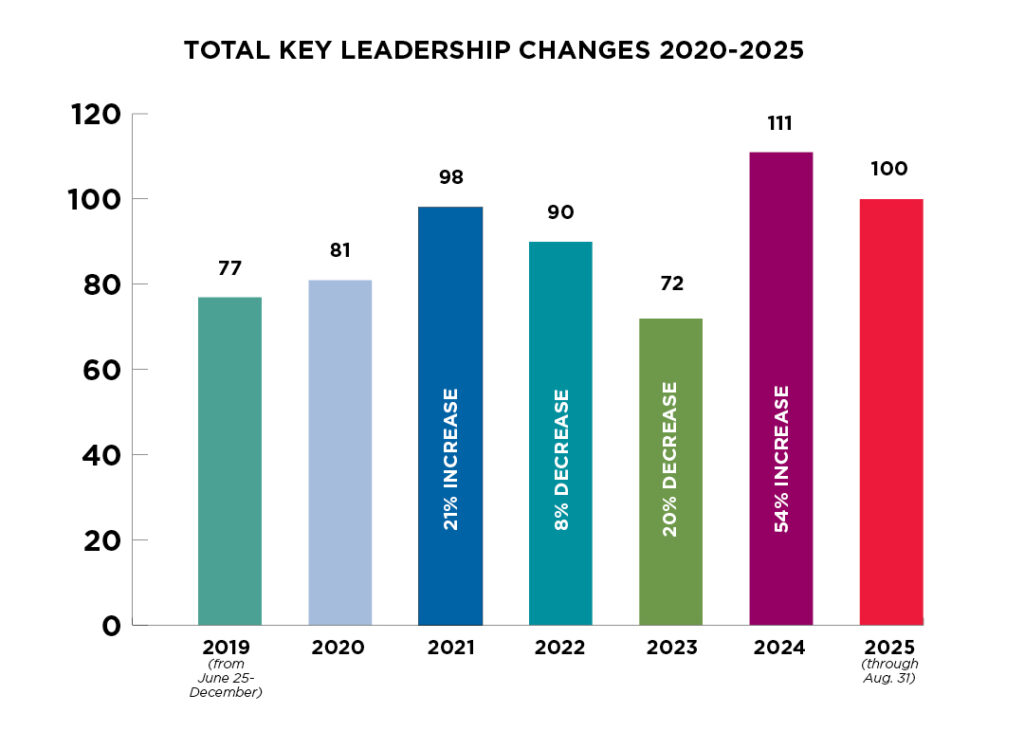A Closer Look: Wendy Wintersteen
President, Iowa State University

Iowa State University’s first female president began her career with the university nearly 40 years ago as an extension specialist in integrated pest management. As dean of the College of Agriculture and Life Sciences for the past 11 years, Wendy Wintersteen led a program ranked among the top 10 in the world, which grew to become the third-largest ag college in the nation. Among her goals since starting as ISU president in November, Wintersteen said she wants to bolster the university’s reputation as a good return on investment for both students and the state, and to make entrepreneurship a unifying piece of ISU’s DNA. She has served on a number of influential boards, among them the University Innovation Alliance, a coalition of 11 public research universities aimed at closing the achievement gap for students with financial need; and the Cultivation Corridor, a regional economic initiative to establish Iowa as the global center for excellence in the ag biosciences, advanced manufacturing and technology sectors. She has begun hosting “Pizza with the President” gatherings to encourage conversations with students, faculty and staff. I spoke with Wintersteen in her Beardshear Hall office in late January, on the same week that she moved into the Knoll and that news broke of additional possible budget cuts for Iowa State.
Are you getting settled into your new home?
We moved into the Knoll on Monday (Jan. 29). Anyone who has lived in a home for 17 years knows how hard that move is. So we have too much stuff in our home for the Knoll, but we’re going to work through that and enjoy ourselves there. You know, I’m required by my contract to live there, which I found quite interesting. Of course, I would want to live there, regardless. And (past ISU President) Greg Geoffroy told me that he and Kathy Geoffroy lived there very comfortably, and I think that’s a very good recommendation from them. It’s a beautiful home — built in 1901.
Best advice you’ve gotten since stepping into this role?
When I decided to apply to be president back in May or June, I visited with friends and colleagues about my application and had some great conversations and received some excellent advice at that time. One of my favorite pieces of advice was from athletic director Jamie Pollard. … What he shared with me, and I take to heart deeply, is that we are an extraordinary university and institution, and oftentimes don’t have some of the resources that some of our peers do. But what we do have is our people, and Jamie said to me that people are “really our secret sauce.” And I believe that; that really is a way of thinking about why we are so successful. I think it’s because of the culture and values we have that values our faculty, staff and students.
Who do you rely on as a mentor?
Certainly an individual I’ve relied on for years as an informal mentor is Greg Geoffroy. I really grew up under his leadership. While he was president here, you may recall we faced some really difficult issues, and some of those were related to agriculture and some were related to the entire university in terms of budgets. But whenever President Geoffroy had a difficult issue, he would bring everyone into that big conference room and he would ask everyone to share their thoughts and opinions about the situation. That allowed him as president to make an informed decision based upon the facts. To me, that was really a way of doing business that I will emulate. I want to hear everyone’s ideas, I want opportunities for groups to meet and share their ideas, so that we can be as creative as possible in finding the right solutions.
What are some of the biggest challenges you see in your first year?
I would say the No. 1 challenge has to be financial resources, where we are with the budget. As we look at proposals in the state Legislature that are, today at least, for some significant cuts on the table, that will be a challenge if that were to become a fact.
Was the legislative proposal for a nearly $7 million budget cut a surprise?
It certainly was a surprise for me. We had the governor’s proposal, which would have a midyear reduction to the regents of about $5.1 million, with Iowa State University responsible for about half of that, so we were kind of in that mindset. So to go from a $2.5 million reduction to almost $7 million at Iowa State really changes the game. One of the failures we’ve had is that we haven’t been able, to date anyway, to demonstrate to the Legislature that Iowa State University is not a cost but that it is a great return on investment. And I think we need to be having more of that conversation.
Do you think the Cultivation Corridor branding is beginning to reap some benefits?
Definitely. The work of Cultivation Corridor has really brought great attention and opportunity to Iowa State University. We’re really the home of the Cultivation Corridor at the ISU Research Park. Mike Crum and the leadership he provides at the Industry Relations Office is very important to what was possible through the Cultivation Corridor. I also believe that the tremendous growth at the research park is tied to the Cultivation Corridor. The research park is yet another example of a great return on investment. You think of a park that now has 82 companies, 1,700 employees and I don’t know many job vacancies, but it’s not insignificant. We think it’s possible over the next years to see a doubling or even a tripling of what’s going on at the research park. Seeing companies and the university come together in the research park is a part of that in a significant way, as is the connection to the Greater Des Moines Partnership.
What are your thoughts on how large ISU’s enrollment should become?
We’ve grown so much in the last five years and even the last 10 years, and much of that growth was to meet the demand for the industries that employ our students. We have a lot of companies saying, “We need more of this kind of student,” so that’s a part of our responsibility, making sure we are graduating those kinds of individuals. What we saw this last fall was a flattening out of enrollment, and that’s what we expected. When you look at demographics and the nation as a whole in decisions related to higher education … I think (36,000) is going to be where we’re at for quite a while. … I think we’re in a good place with student numbers right now.
How can tuition be kept affordable?
Well, the state Legislature plays a big role in that, so as we see proposed budget cuts, I think that impacts how affordable an Iowa State education will be in the future. However, we are very blessed that we have great donors who continue to increase the amount of support they provide privately for scholarships — last year $16.5 million. We rely heavily on private support for scholarships, and the need is going to be even greater in the future. The Board of Regents in the next six months will make a decision on what the resident tuition will be, and I think they’ll be greatly influenced by what happens in the Iowa Legislature.
What are the chances for restored funding for the Leopold Center?
The Leopold Center situation was really a terrible situation for Iowa State University. I learned about the proposed elimination of the funding and the center one evening, and nine days later the funding had been removed. The university, with friends of the Leopold Center, were able to keep it alive. It has a small private endowment, and we are continuing conversations, how do we grow that private endowment in support of the program. I think it’s important to note that the 80-some faculty in the area of sustainable agriculture, they’re still here working and obtaining grants from other agencies. But what has been lost is that often the Leopold Center would be the seed funding for a great idea. An example of that is a project to develop prairie strips at the Neal Smith Refuge in fields to hold the soil and reduce nutrient flow. It’s been phenomenally successful, and that started with a grant from the Leopold Center that led to significant federal funding. Maybe in the future the Legislature will be interested in seeing a reinvestment.
In regard to campus safety, is enough being done to address sexual assaults?
We have a zero tolerance policy on sexual harassment and sexual assault. We have a very good set of policies in place requiring mandatory reporting so that we are aware. This morning we had president’s council where we talked about this issue, and said that we have to begin by always believing what a victim shares with us, and then you begin an investigation into that situation. We’ve seen over and over again situations that turn out quite badly because the victim was not believed or because there was not a system of mandatory reporting. We’re committed to addressing these issues; we have good policies in place. … It’s really awareness and being willing to talk about these issues.
Five years from now, what do you hope people will say about ISU?
In five years if we can change people’s minds so that they’re saying Iowa State is a great return on investment, that would make me extremely happy. One of the ways I hope to achieve that is by being out in the state and talking to Iowans, hearing what they would like to see Iowa State do. … And one of my priorities is entrepreneurship. This is something that all the deans in the university have agreed upon as a priority; it’s something we actually started working on last fall about how we could infuse entrepreneurship into the undergraduate curriculum, how we could change the opportunities for undergraduates and for Iowa by having entrepreneurship be a focus. … If in five years part of the brand of Iowa State University could be entrepreneurship … then I think we will have achieved something that will change the future for Iowa State University.
What personal interests do you enjoy?
I have my wonderful husband, Robert Waggoner, so I’m very attached to him. We both enjoy traveling and seeing new sights together. We especially enjoy going out to Glenwood Springs, Colo. That’s one of our favorite vacation spots. We also like to vacation all around the world and see new sights. I love to read, and when I’m relaxing I like to read murder mysteries. Louise Penny is an author I highly recommend. When I had more time I used to like working out in my garden; mainly I enjoyed weeding … you can see the results.








